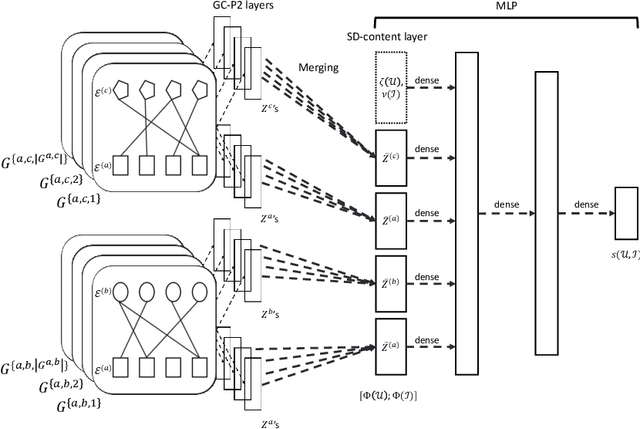Ayush Choure
Attention Enhanced Entity Recommendation for Intelligent Monitoring in Cloud Systems
Oct 23, 2025Abstract:In this paper, we present DiRecGNN, an attention-enhanced entity recommendation framework for monitoring cloud services at Microsoft. We provide insights on the usefulness of this feature as perceived by the cloud service owners and lessons learned from deployment. Specifically, we introduce the problem of recommending the optimal subset of attributes (dimensions) that should be tracked by an automated watchdog (monitor) for cloud services. To begin, we construct the monitor heterogeneous graph at production-scale. The interaction dynamics of these entities are often characterized by limited structural and engagement information, resulting in inferior performance of state-of-the-art approaches. Moreover, traditional methods fail to capture the dependencies between entities spanning a long range due to their homophilic nature. Therefore, we propose an attention-enhanced entity ranking model inspired by transformer architectures. Our model utilizes a multi-head attention mechanism to focus on heterogeneous neighbors and their attributes, and further attends to paths sampled using random walks to capture long-range dependencies. We also employ multi-faceted loss functions to optimize for relevant recommendations while respecting the inherent sparsity of the data. Empirical evaluations demonstrate significant improvements over existing methods, with our model achieving a 43.1% increase in MRR. Furthermore, product teams who consumed these features perceive the feature as useful and rated it 4.5 out of 5.
Intelligent Monitoring Framework for Cloud Services: A Data-Driven Approach
Feb 29, 2024



Abstract:Cloud service owners need to continuously monitor their services to ensure high availability and reliability. Gaps in monitoring can lead to delay in incident detection and significant negative customer impact. Current process of monitor creation is ad-hoc and reactive in nature. Developers create monitors using their tribal knowledge and, primarily, a trial and error based process. As a result, monitors often have incomplete coverage which leads to production issues, or, redundancy which results in noise and wasted effort. In this work, we address this issue by proposing an intelligent monitoring framework that recommends monitors for cloud services based on their service properties. We start by mining the attributes of 30,000+ monitors from 791 production services at Microsoft and derive a structured ontology for monitors. We focus on two crucial dimensions: what to monitor (resources) and which metrics to monitor. We conduct an extensive empirical study and derive key insights on the major classes of monitors employed by cloud services at Microsoft, their associated dimensions, and the interrelationship between service properties and this ontology. Using these insights, we propose a deep learning based framework that recommends monitors based on the service properties. Finally, we conduct a user study with engineers from Microsoft which demonstrates the usefulness of the proposed framework. The proposed framework along with the ontology driven projections, succeeded in creating production quality recommendations for majority of resource classes. This was also validated by the users from the study who rated the framework's usefulness as 4.27 out of 5.
Rich-Item Recommendations for Rich-Users via GCNN: Exploiting Dynamic and Static Side Information
Jan 28, 2020



Abstract:We study the standard problem of recommending relevant items to users; a user is someone who seeks recommendation, and an item is something which should be recommended. In today's modern world, both users and items are 'rich' multi-faceted entities but existing literature, for ease of modeling, views these facets in silos. In this paper, we provide a general formulation of the recommendation problem that captures the complexities of modern systems and encompasses most of the existing recommendation system formulations. In our formulation, each user and item is modeled via a set of static entities and a dynamic component. The relationships between entities are captured by multiple weighted bipartite graphs. To effectively exploit these complex interactions for recommendations, we propose MEDRES -- a multiple graph-CNN based novel deep-learning architecture. In addition, we propose a new metric, pAp@k, that is critical for a variety of classification+ranking scenarios. We also provide an optimization algorithm that directly optimizes the proposed metric and trains MEDRES in an end-to-end framework. We demonstrate the effectiveness of our method on two benchmarks as well as on a message recommendation system deployed in Microsoft Teams where it improves upon the existing production-grade model by 3%.
 Add to Chrome
Add to Chrome Add to Firefox
Add to Firefox Add to Edge
Add to Edge